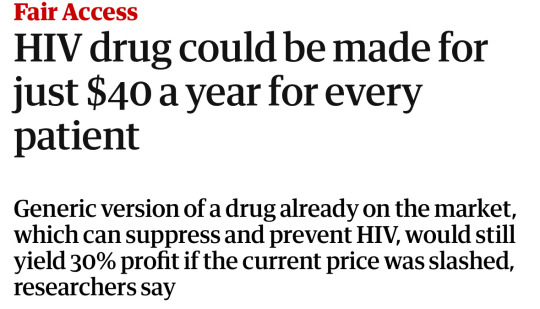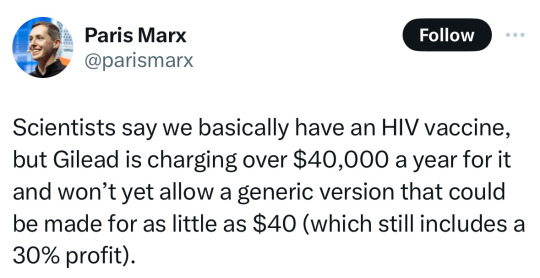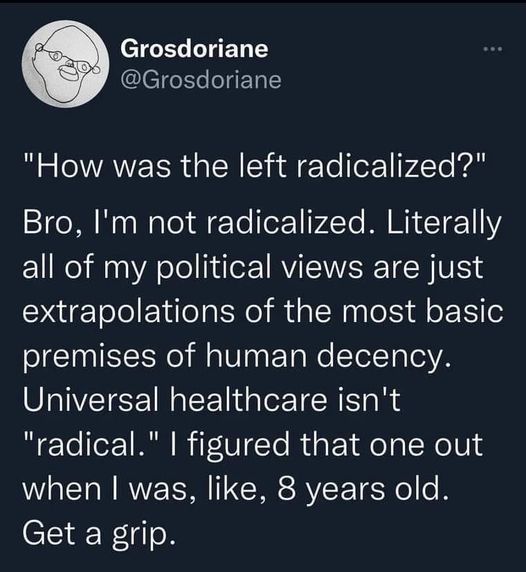#health Care
Explore tagged Tumblr posts
Note

The unfortunate thing about all those stupid over-hyped Mental Health And Self-Improvement advice blogs/listicles is...
they work.
Go for a walk. Meet once a week with two friends to talk over stupid things that are NOT fandom or politics. (Have a tea party. Even if you don't care about tea. Have coffee, or cocoa, or juice with weird-shaped ice cubes, or whatever.) Plan a meal or snack that's one of your favorites that you don't normally do because nobody else you know likes it. Look into the mirror and say "I like myself" three times every morning. Stand up and do isometric stretches for five minutes, twice a day. Go outside and look at the far horizon and mentally list the five farthest things you can see. Then find a patch of dirt and list the five smallest things you can see.
Do something - ANYTHING - to break yourself out of the mental and physical habits you've developed, a few times a week.
The goal is not "develop good habits." It's "make yourself not-miserable for your normal preferred habits." It's "break whatever has been keeping you from enjoying the stuff you normally enjoy."
And it is okay to be really, really annoyed that a 5-minute walk to the end of the block and noticing the shapes of three kinds of leaves on the way actually makes a difference in your mood. It's stupid. It is really annoying that it works.
Hi OTNF and everyone,
I am finding that it's harder and harder and harder to get into anything - book, show, movie... most things seem, you know, to just not be doing it for me, be it fanfic or original stuff.
In part, I think, it's a general restlessness and that it's become harder to give anything enough time to get into the stories, the characters, the settings, the narrative voices... I guess you can call it attention deficit on my part, just a need for stories to deliver those sweet, sweet hits quickly, but they're not.
I'm not currently ficcing but I did for years (might again in the future, who knows), and it's made reading, specifically, harder. It's like I've become more aware of what goes on behind the scene, I guess? I feel like I can see the writer giving up on a sentence, skipping a scene because fuck this, trying hard to not repeat a word although it's the only one that fits, etc.
Or maybe it's just the *everything* around us in the world that is weighing on me too much? I could say it's adult life, but then again I have more free time than most (and boy do I need hours of doing nothing to survive the other hours), and no family/partner (all that would put even more pressure on me): what is wrong, to make everything so UGHHH?
I feel like I'm stuck in a rut with a brain moaning feed me, feeeed me, and whatever I try to give it, it spits everything out. (Yes, I've tried hobbies, and nothing sticks there either. I've never really found rewards or satisfaction there, so...)
Decades ago as a kid, I was a voracious reader, although studying literature took the pleasure of it away from me. It took time and discovering fanfic that brought me back to reading, but at the time the internet was starting to be a thing, too, and it can't have helped the attention thing. AFAIK I'm not ADHD but then again, I couldn't get a proper diagnosis (the therapists I saw were either dismissive or just about The Talking, which was pointless for me).
I just wonder how it all disappeared, you know? Sometimes I find something that catches my attention for a while - a book (but I read quite quickly when motivated), a fandom... but it's been a while now, and it's just so frustrating! When is it going to come back? Will it ever? *gulp*
I know that books were escapism when I was a child, and then fandom was escapism, but at the moment I find myself grabbing at air and my empty hands are mocking me. Give me my escapism baaaaack!
So, uh. Anyone here with me?
--
Yes.
I felt like that during part of lockdown. Anhedonia is common in those kinds of circumstances.
Getting your mojo back is certainly possible, but you may need to go see a professional about depression and have some chemical assistance (yes, even if you don't feel sad per se), or you may need to change your lifestyle to one that doesn't have the thing causing you to need eleventy billion hours of downtime.
Aside from serious interventions like that, you can consider a social media detox. Remove every source of doomscrolling and time wasting of that type. When the attention span is zero and nothing brings joy, the tiny and useless hits from finishing a game of solitaire or seeing one more instagram post become very attractive. This is a trap. It will suck what little energy and joy you have and make your muscles flabby for the work of getting into an in-depth book/hobby/experience.
I know the feeling of being able to see how the sausage is made, but... well... first, being in a better mental state will make that matter less, and second, reading prose that is more competent will make that less of an issue. A lot of mainstream tradpub genre fiction is not, in my opinion, very well written these days. Obviously, people are still enjoying it, and that's fine, but if you're noticing writers fumbling around, it might be time to check out some literary fiction or some other category known more for prose quality than anything else.
It's also important to have some structure and some things to look forward to. Even if you feel tired, overwhelmed, and busy, sometimes, the answer is to do more... But it must be things that are distinct and significant and that get you off of the couch, like going to one museum every weekend.
I saw some advice once about this kind of thing that phrased it as "One big adventure; one small adventure."
Every week, you should have those two things to look forward to that matter. Check out a new coffee shop. That could be the small one. Go to an event: a gallery opening, a concert, whatever.
Physical exercise and doing some things that aren't as verbal and conscious thought-involving is important too. Painting is a better hobby for zoning out than writing is. Taking long walks in nature is good for most people.
--
The kind of intense, obsessive love I had for reading as a child and that I sometimes have for fandom requires a lot of attention and some time. It's escapist, but that masks how much work it actually was. It didn't feel like work only because we were in training.
If you've filled your brain and your day up with a thousand petty annoyances or minor and useless attempts to feel something, you won't have the capacity for those deeper things.
Because you are already at a point that's equivalent to a bad sprained ankle, trying to get back to running right now won't work. You have to stay off of the ankle for a bit, then build your strength and stamina back up.
170 notes
·
View notes
Text




Source
This entire article is worth the read. Fuck Gilead
#big pharma#hiv#hiv/aids#the left#news#current events#health#health care#capitalism#public health#corporate greed
45K notes
·
View notes
Text
"hOw cAN YoU MoCk a DEaD mAn??"
Well, unfortunately, he was reckless and didn't prepare ahead of time, so he failed to meet the requirements that prove he actually NEEDS access to quality grief and mourning.
His limited plan only covered brief consideration as a passing thought, so unfortunately, he had to pay for his own consequences out of pocket. 🤷🏽♀️🫤🤷🏽♀️
17K notes
·
View notes
Text

Scares the Dickens out them. 😳
#deny defend depose#deny#defend#depose#bullets#uhc ceo#ceo shooter#ceo#ceo shooting#united healthcare#uhc#a christmas carol#charles dickens#3 spirits#ghosts#meme#memes#funny memes#health care#health care memes#health insurance#us politics#american politics#USpol
12K notes
·
View notes
Text

We need to end lobbyism as we know it. Corporate bribery is the worst way to provide a human right like health care.
Sad that $800 million/year in bribes costs us $650 billion/year in savings.
22K notes
·
View notes
Text
Since folks are exhausted from hearing about Project 2025 and Agenda 47, here are some reasons to feel hopeful about Harris
(It would be wonderful if folks could reblog this, a lot of people are feeling very discouraged right now and could use the morale boost!)
#politics#uspol#us politics#american politics#voting matters#kamala harris#election 2024#2024 elections#vote blue#abortion rights#reproductive rights#healthcare#health care#gun control#queer rights#trans rights#palestine#hope
12K notes
·
View notes
Text
I hope the CEO of united healthcare gets stuck in queue at the pearly gates indefinitely while terrible Muzak plays and an angel’s voice very occasionally calls out “Your afterlife is very important to us. Please stay in the line” and then his entrance is denied.
4K notes
·
View notes
Text



On that last point about Brian Thompson as a "father", how many children have lost a parent needlessly because of the disgusting, profiteering health insurance and healthcare industry?!
3K notes
·
View notes
Text
In the wake of the CEO shooting, Michael Moore has uploaded his full documentary, Sicko, on youtube to be watched for free. Moore is one of the most known criticizing journalists of corporate america, and his work is cited in the alleged killer's manifesto. He's given us a christmas gift, by making his comprehensive knowledge free for everyone to look at If you got two hours, go watch. Share it with friends and family https://youtu.be/YbEQ7acb0IE
3K notes
·
View notes
Text



Source

#politics#hiv#us politics#government#gilead#lgbt#lgbtq#progressive#current events#science#medicine#health#health care#the left#twitter post#news
38K notes
·
View notes
Text

76K notes
·
View notes
Text
know someone who enjoys horror stories? share this one! it's true!
hahahahahahahahahaha aarrggghhhhhhhhhh 3,000,000 deaths due to COVID-19 last year. Globally. Three million. Case rates higher than 90% of the rest of the pandemic. The reason people are still worried about COVID is because it has a way of quietly fucking up your body. And the risk is cumulative.
I'm going to say that again: the risk is cumulative.
It's not just that a lot of people get bad long-term effects from it. One in seven or so? Enough that it's kind of the Russian Roulette of diseases. It's also that the more times you get it, the higher that risk becomes. Like if each time you survived Russian Roulette, the empty chamber was removed from the gun entirely. The worst part is that, psychologically, we have the absolute opposite reaction. If we survive something with no ill effects, we assume it's pretty safe. It is really, really hard to override that sense of, "Ok, well, I got it and now I probably have a lot of immunity and also it wasn't that bad." It is not a respiratory disease. Airborne, yes. Respiratory disease, no: not a cold, not a flu, not RSV.
Like measles (or maybe chickenpox?), it starts with respiratory symptoms. And then it moves to other parts of your body. It seems to target the lungs, the digestive system, the heart, and the brain the most.
It also hits the immune system really hard - a lot of people are suddenly more susceptible to completely unrelated viruses. People get brain fog, migraines, forget things they used to know.
(I really, really hate that it can cross the blood-brain barrier. NOTHING SHOULD EVER CROSS THE BLOOD-BRAIN BARRIER IT IS THERE FOR A REASON.) Anecdotal examples of this shit are horrifying. I've seen people talk about coworkers who've had COVID five or more times, and now their work... just often doesn't make sense? They send emails that say things like, "Sorry, I didn't mean Los Angeles, I meant Los Angeles."
Or they insist they've never heard of some project that they were actually in charge of a year or two before.
Or their work is just kind of falling apart, and they don't seem to be aware of it.
People talk about how they don't want to get the person in trouble, so their team just works around it. Or they describe neighbors and relatives who had COVID repeatedly, were nearly hospitalized, talked about how incredibly sick they felt at the time... and now swear they've only had it once and it wasn't bad, they barely even noticed it.
(As someone who lived with severe dissociation for most of my life, this is a genuinely terrifying idea to me. I've already spent my whole life being like, "but what if I told them that already? but what if I did do that? what if that did happen to me and I just don't remember?") One of its known effects in the brain is to increase impulsivity and risk-taking, which is real fucking convenient honestly. What a fantastic fucking mutation. So happy for it on that one. Yes, please make it seem less important to wear a mask and get vaccinated. I'm not screaming internally at all now.

I saw a tweet from someone last year whose family hadn't had COVID yet, who were still masking in public, including school.
She said that her son was no kind of an athlete. Solidly bottom middle of the pack in gym.
And suddenly, this year, he was absolutely blowing past all the other kids who had to run the mile. He wasn't running any faster. His times weren't fantastic or anything. It's just that the rest of the kids were worse than him now. For some reason. I think about that a lot. (Like my incredibly active six-year-old getting a cold, and suddenly developing post-viral asthma that looked like pneumonia.
He went back to school the day before yesterday, after being home for a month and using preventative inhalers for almost week.
He told me that it was GREAT - except that he couldn't run as much at recess, because he immediately got really tired. Like how I went outside with him to do some yard work and felt like my body couldn't figure out how to increase breathing and heart rate.
I wasn't physically out of breath, but I felt like I was out of breath. That COVID feeling people describe, of "I'm not getting enough air." Except that I didn't have that problem when I had COVID.) Some people don't observe any long (or medium) term side effects after they have it.
But researchers have found viral reservoirs of COVID-19 in everyone they've studied who had it.
It just seems to hang out, dormant, for... well, longer than we've had an opportunity to observe it, so far.
(I definitely watched that literal horror movie. I think that's an entire genre. The alien dormant under ice in the Arctic.)
(oh hey I don't like that either!!!!!!!!!) All of which is to explain why we should still care about avoiding it, and how it manages to still cause excess deaths. Measuring excess deaths has been a standard tool in public health for a long time.
We know how many people usually die from all different causes, every year. So we can tell if, for example, deaths from heart disease have gone way up in the past three years, and look for reasons. Those are excess deaths: deaths that, four years ago, would not have happened. During the pandemic, excess death rates have been a really important tool. For all sorts of reasons. Like, sometimes people die from COVID without ever getting tested, and the official cause is listed as something else because nobody knows they had COVID. But also, people are dying from cardiovascular illness much younger now.
People are having strokes and heart attacks younger, and more often, than they did before the pandemic started. COVID causes a lot of problems. And some of those problems kill people. And some of them make it easier for other things to kill us. Lung damage from COVID leading to lungs collapsing, or to pneumonia, or to a pulmonary embolism, for example. The Economist built a machine-learning model with a 95% confidence interval that gauges excess death statistics around the world, to tell them what the true toll of the ongoing COVID pandemic has been so far.
Total excess deaths globally in 2023: Three million.
3,000,000.
Official COVID-19 deaths globally so far: Seven million. 7,000,000. Total excess deaths during COVID so far: Thirty-five point two million. 35,200,000.
Five times as many.
That's bad. I don't like that at all. I'm glad last year was less than a tenth of that. I'm not particularly confident about that continuing, though, because last year we started a period of really high COVID transmission. Case rates higher than 90% of the rest of the pandemic. Here's their data, and charts you can play with, and links to detailed information on how they did all of this:
Here's a non-paywalled link to it:
https://archive.vn/2024.01.26-012536/https://www.economist.com/graphic-detail/coronavirus-excess-deaths-estimates
Oh: here's a link to where you can buy comfy, effective N95 masks in all sizes:
Those ones are about a buck each after shipping - about $30 for a box of 30. They also have sample packs for a dollar, so you can try a couple of different sizes and styles.
You can wear an N95 mask for about 40 total hours before the effectiveness really drops, so that's like a dollar for a week of wear.
They're also family-owned and have cat-shaped masks and I really love them. These ones are cuter and in a much wider range of colors, prints, and styles, but they're also more expensive; they range from $1.80 to $3 for a mask. ($18-$30 for a box of ten.)
#covid isn't over#covid 19#disability rights#disability advocacy#wear a mask#covid conscious#covid cautious#mask up#wall of words#public health#health care
8K notes
·
View notes
Text
Things Biden and the Democrats did, this week #16
April 26-May 3 2024
President Biden announced $3 billion to help replace lead pipes in the drinking water system. Millions of Americans get their drinking water through lead pipes, which are toxic, no level of lead exposure is safe. This problem disproportionately affects people of color and low income communities. This first investment of a planned $15 billion will replace 1.7 million lead pipe lines. The Biden Administration plans to replace all lead pipes in the country by the end of the decade.
President Biden canceled the student debt of 317,000 former students of a fraudulent for-profit college system. The Art Institutes was a for-profit system of dozens of schools offering degrees in video-game design and other arts. After years of legal troubles around misleading students and falsifying data the last AI schools closed abruptly without warning in September last year. This adds to the $29 billion in debt for 1.7 borrowers who wee mislead and defrauded by their schools which the Biden Administration has done, and a total debt relief for 4.6 million borrowers so far under Biden.
President Biden expanded two California national monuments protecting thousands of acres of land. The two national monuments are the San Gabriel Mountains National Monument and the Berryessa Snow Mountain National Monument, which are being expanded by 120,000 acres. The new protections cover lands of cultural and religious importance to a number of California based native communities. This expansion was first proposed by then Senator Kamala Harris in 2018 as part of a wide ranging plan to expand and protect public land in California. This expansion is part of the Administration's goals to protect, conserve, and restore at least 30 percent of U.S. lands and waters by 2030.
The Department of Transportation announced new rules that will require car manufacturers to install automatic braking systems in new cars. Starting in 2029 all new cars will be required to have systems to detect pedestrians and automatically apply the breaks in an emergency. The National Highway Traffic Safety Administration projects this new rule will save 360 lives every year and prevent at least 24,000 injuries annually.
The IRS announced plans to ramp up audits on the wealthiest Americans. The IRS plans on increasing its audit rate on taxpayers who make over $10 million a year. After decades of Republicans in Congress cutting IRS funding to protect wealthy tax cheats the Biden Administration passed $80 billion for tougher enforcement on the wealthy. The IRS has been able to collect just in one year $500 Million in undisputed but unpaid back taxes from wealthy households, and shows a rise of $31 billion from audits in the 2023 tax year. The IRS also announced its free direct file pilot program was a smashing success. The program allowed tax payers across 12 states to file directly for free with the IRS over the internet. The IRS announced that 140,000 tax payers were able to use it over their target of 100,000, they estimated it saved $5.6 million in tax prep fees, over 90% of users were happy with the webpage and reported it quicker and easier than companies like H&R Block. the IRS plans to bring direct file nationwide next year.
The Department of Interior announced plans for new off shore wind power. The two new sites, off the coast of Oregon and in the Gulf of Maine, would together generate 18 gigawatts of totally clean energy, enough to power 6 million homes.
The Biden Administration announced new rules to finally allow DACA recipients to be covered by Obamacare. Deferred Action for Childhood Arrivals (DACA) is an Obama era policy that allows people brought to the United States as children without legal status to remain and to legally work. However for years DACA recipients have not been able to get health coverage through the Obamacare Health Care Marketplace. This rule change will bring health coverage to at least 100,000 uninsured people.
The Department of Health and Human Services finalized rules that require LGBTQ+ and Intersex minors in the foster care system be placed in supportive and affirming homes.
The Senate confirmed Georgia Alexakis to a life time federal judgeship in Illinois. This brings the total number of federal judges appointed by President Biden to 194. For the first time in history the majority of a President's nominees to the federal bench have not been white men.
#Thanks Biden#Joe Biden#student loans#loan forgiveness#lead poisoning#clean water#DACA#health care#LGBT rights#queer kids#taxes#tax the rich
5K notes
·
View notes





